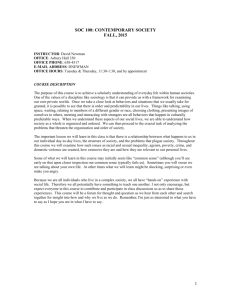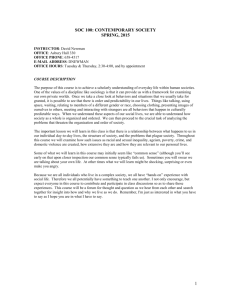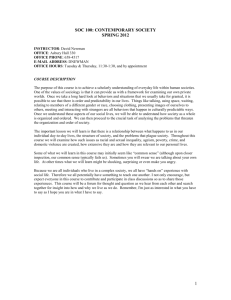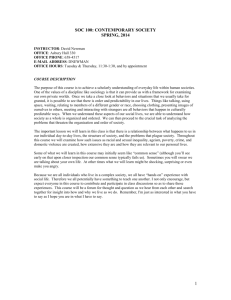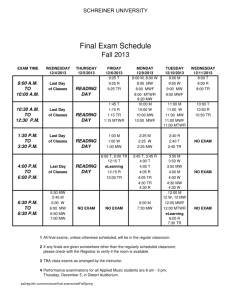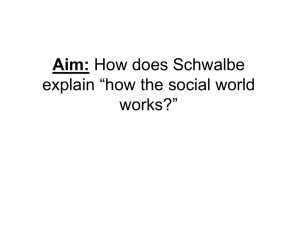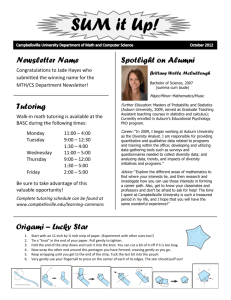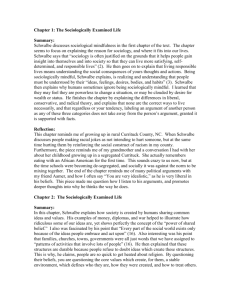Soc 100B Contemporary Society
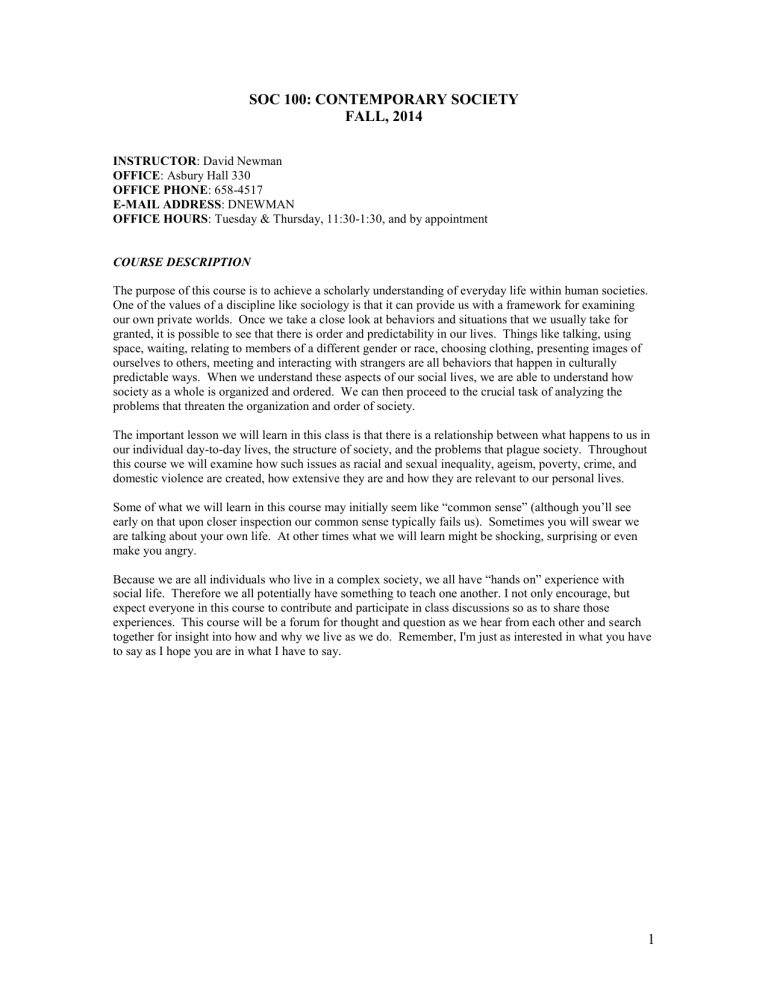
SOC 100: CONTEMPORARY SOCIETY
FALL, 2014
INSTRUCTOR : David Newman
OFFICE : Asbury Hall 330
OFFICE PHONE : 658-4517
E-MAIL ADDRESS : DNEWMAN
OFFICE HOURS : Tuesday & Thursday, 11:30-1:30, and by appointment
COURSE DESCRIPTION
The purpose of this course is to achieve a scholarly understanding of everyday life within human societies.
One of the values of a discipline like sociology is that it can provide us with a framework for examining our own private worlds. Once we take a close look at behaviors and situations that we usually take for granted, it is possible to see that there is order and predictability in our lives. Things like talking, using space, waiting, relating to members of a different gender or race, choosing clothing, presenting images of ourselves to others, meeting and interacting with strangers are all behaviors that happen in culturally predictable ways. When we understand these aspects of our social lives, we are able to understand how society as a whole is organized and ordered. We can then proceed to the crucial task of analyzing the problems that threaten the organization and order of society.
The important lesson we will learn in this class is that there is a relationship between what happens to us in our individual day-to-day lives, the structure of society, and the problems that plague society. Throughout this course we will examine how such issues as racial and sexual inequality, ageism, poverty, crime, and domestic violence are created, how extensive they are and how they are relevant to our personal lives.
Some of what we will learn in this course may initially seem like “common sense” (although you’ll see early on that upon closer inspection our common sense typically fails us). Sometimes you will swear we are talking about your own life. At other times what we will learn might be shocking, surprising or even make you angry.
Because we are all individuals who live in a complex society, we all have “hands on” experience with social life. Therefore we all potentially have something to teach one another. I not only encourage, but expect everyone in this course to contribute and participate in class discussions so as to share those experiences. This course will be a forum for thought and question as we hear from each other and search together for insight into how and why we live as we do. Remember, I'm just as interested in what you have to say as I hope you are in what I have to say.
1
COURSE REQUIREMENTS
Grades will be based on 3 in-class exams, participation in an issue panel presentation, a short issue-related paper, and class participation throughout the semester.
EXAMS . There will be 3 non-overlapping exams. The exams will consist of short definitions and detailed essay questions based on class readings and lectures. “Study guides” will be handed out 1 week prior to the exam date. Definitional terms and essay questions that are on the exam will be chosen directly from the “study guide.” Exam dates are listed below.
ISSUE PANEL AND ESSAY PAPER . 7 panel discussions, each covering a different issue of sociological relevance, will be held throughout the semester (I will hand out topics the first week of class). You will be asked to sign up for one of these panels. There will be three or four students on each panel. Panels will be responsible for a 40-minute in-class presentation on topics related to their issue. Each student will write an original 7-page paper on the topic that s/he chooses to include in the issue panel. The paper will be due one week or so after the in-class panel presentation. In addition to course lectures and readings, you will be required to use information from outside sources (e.g., academic journal articles and books) in preparing this paper.
ATTENDANCE AND CLASS PARTICIPATION . I believe that learning is an interactive process. Much of the material for this course will be covered in class and will rely heavily on inclass discussion and debate. The success or failure of any class hinges, to a large extent, on the combination of the people involved. Therefore, regular class attendance is mandatory and active participation is not only encouraged but expected. Please do not bring your laptops to class
(unless I instruct you to do so). The lure of email, Facebook, Twitter, and other distractions is simply to strong to avoid, making class discussion difficult.
GRADING. Points will be assigned as follows:
Exam 1 60 points
Exam 2 60 points
Exam 3 60 points
Issue paper 40 points
Panel discussion 20 points
Class Participation 10 points
---------
Total 250 points
I use a non-competitive grade scale. This means that the grade you receive will depend entirely on your mastery of the course material, not on how well your performance compares to others in the class.
REQUIRED READINGS (all available at the campus bookstore)
Susan Ferguson, Mapping the Social Landscape, 7 th edition, New York: McGraw-Hill, 2013
David Newman & Jodi O’Brien, Sociology: Exploring the Architecture of Everyday Life
(Readings ) 9 th edition, Thousand Oaks, CA: Pine Forge Press, 2013
Robert Lauer & Jeanette Lauer, Sociology: Windows on Society , 7 th edition , New York:
Oxford University Press, 2007
Michael Schwalbe, The Sociologically Examined Life , 4 th edition , New York: McGraw-Hill,
2008
2
DISABILITY ACCOMODATIONS
“DePauw University is committed to providing equal access to academic programs and university administered activities with reasonable accommodations to students with disabilities, in compliance with the Americans With Disabilities Act and Amendments (ADAAA). Any student who feels she or he may need an accommodation based on the impact of a disability or learning challenge is strongly encouraged to contact Pamela Roberts, Director of Student Disability Services and ADA Compliance for further information on how to receive accommodations and support. Contact information for Student Disability
Services is: 408 S. Locust Street, Suite 200, in The Memorial Student Union Building (765-658-6267 ). It is the responsibility of the student to share the letter of accommodation with faculty and staff members.
Accommodations will not be implemented until the faculty or staff member has received the official letter.
Accommodations are not retroactive. It is the responsibility of the student to discuss implementation of accommodations with each faculty and staff member receiving the letter.”
TENTATIVE SCHEDULE OF WEEKLY TOPICS AND READING ASSIGNMENTS
[NOTE: (F)=Ferguson; (L&L)=Lauer & Lauer; (N&O)=Newman & O’Brien]
WEEK 1 (WF) & WEEK 2 (MWF): INTRODUCTION TO THE COURSE AND TO SOCIOLOGY
H. Kelman & V.L. Hamilton, "The My Lai massacre: A military crime of obedience" (N&O), pp. 14-26
M. Colvin, “Descent into madness” (F), pp. 229-242
D. Gaines, “Teenage wasteland” (F), pp. 7-18
C.W. Mills, "The Sociological Imagination" (N&O), pp. 5-9
M. Schwalbe, The Sociologically Examined Life, chapter 1 (“Making sense of the world differently”) and chapter 4 (“Relationships, groups, and interdependence”)
B. Glassner, “Culture of fear” (N&O), pp. 44-56
D. Conley, “The birth of the intravidual” (F), pp. 169-178
**FILM: PERIOD PIECE, Wednesday, September 3**
WEEK 3 (MWF): CULTURE AND THE ORGANIZATION OF EVERYDAY LIFE
J. L. Watson, “McDonald’s in Hong Kong” (N&O), pp. 91-98
H. Miner, “Body ritual among the Nacirema” (N&O), pp. 77-80
A. Fadiman, “The melting pot” (N&O), pp. 81-90
H-K. Trask, “Lovely hula hands,” (F), pp. 113-120
R. Dibiase & J. Gunnoe, “Gender and culture differences in touching” (L&L), pp. 113-122
**FILM: A WORLD OF FOOD, Wednesday, September 10 **
WEEK 4 (MWF): SOCIALIZATION AND THE CONSTRUCTION OF SOCIAL REALITY
M. Romero, “Life as the maid’s daughter: An exploration of the everyday boundaries of race, class, and gender” (N&O), pp. 101-109
A.M. Lindner, “Controlling the media in Iraq,” (F), pp. 453-463
M. Milner, “Creating consumers: Freaks, geeks, and cool kids” (N&O), pp. 245-251
G. Dyer, “Anybody’s son will do” (F), pp. 158-168
Schwalbe, The Sociologically Examined Life, chapter 2 (“Inventing the social world”) and chapter 5 (“Becoming human”)
B. Lucal, “What it means to be gendered me.” (F), pp. 301-314
C. J. Pascoe, “Dude, You’re a fag?” (F), pp. 315-323
3
N. Jones, “Working ‘the code’: On girls, gender, and inner-city violence” (N&O), pp. 118-
126
E.W. Kane, “Now way my boys are going to be like that!” (F), pp. 121-133
B.J. Risman & K. Myers, “As the twig is bent: Children reared in feminist households”
(L&L), pp. 77-88
WEEK 5 (MF) AND WEEK 6 (M): IMPRESSION FORMATION AND IMPRESSION
MANAGEMENT
D. Gimlin, “Cosmetic surgery: Beauty as commodity” (L&L), pp. 51-63
E. Shapiro, “New biomedical technologies, new scripts, new genders” (N&O), pp. 333-345
E. Goffman, “The presentation of self in everyday life: Selections” (N&O), pp. 129-138
K. Lacy, “Public identities: Managing race in public spaces (N&O), pp. 139-151
R. Granfield, "Making it by faking it: Working-class students in an elite academic
environment" (F), pp. 145-157
D. Grazian, “The girl hunt: Urban nightlife and the performance of masculinity as collective activity” (N&O), pp. 152-160
Schwalbe, The Sociologically Examined Life, chapter 9 (“Images, representations and accounts”)
**FILM: THE BRO CODE, Monday, September 22**
***EXAM 1: WEDNESDAY, SEPTEMBER 24***
WEEK 6 (WF) & WEEK 7 (MWF): CONTACTS AMONG INTIMATES: CONSTRUCTING
SOCIAL RELATIONSHIPS
J. Stacey, “Gay parenthood and the end of paternity as we knew it” (N&O), pp. 174-188
S. Coontz, “The radical idea of marrying for love” (N&O), pp. 163-173
A. J. Cherlin, “The deinstitutionalization of American marriage” (F), pp. 586-598
D. Fee, “Covenant marriage: Reflexivity and retrenchment in the politics of intimacy”
(N&O), 189-193
D.K. Hibbler & K.J. Shinew, “The social life of interracial couples” (L&L), pp. 123-133
K. Edin & M. Kefalas, “Unmarried with children” (F), 598-606
L.B. Rubin, “The transformation of family life” (L&L), pp. 238-248
K. Ferraro & J. Johnson, “How women experience battering: The process of victimization”
(L&L), pp. 205-213
**FILM: THREE OF HEARTS, Wednesday, October 8. Evening showing (7:30pm) **
WEEKS 8 THROUGH 12: INEQUALITY AND STRATIFICATION
A. SOCIAL CLASS [WEEK 8 (MWF)]
Schwalbe, The Sociologically Examined Life , chapter 10 (“Understanding power in social life”) and chapter 11 (“Differences and inequalities”)
G. W. Domhoff, “Who rules America?” (F), pp. 253-266
M.L. Stevens, “A school in a garden” (F), pp. 564-577
T. M. Shapiro, “Race, homeownership, and wealth” (F), pp. 266-277
K. Davis, W.E. Moore, & M. Tumin, “Some principles of stratification” (F), pp. 243-252
W. Greider, “These dark satanic mills” (N&O), pp. 225-234
4
WEEK 9 IS FALL BREAK – NO CLASS FROM MONDAY, OCTOBER 20 TO FRIDAY,
OCTOBER 24
B. POVERTY [Week 10 (MWF)]
F. Block, A. C. Korteweg, & K. Woodward, “The compassion gap in American poverty policy” (N&O), pp. 262-270
V. Adair, “Branded with infamy: Inscriptions of poverty and class in America (N&O), pp.
271-281
B. Ehrenreich, “Nickel-and-dimed” (F), pp. 278-291
M.R. Rank, H-S Yoon, & T.A. Hirschl, “American poverty as a structural failing” (L&L), pp.
145-159
B.A. Arrighi, “America’s shame: Women and children in shelters” (L&L), pp. 160-166
C. RACIAL INEQUALITY [WEEK 11 (MF) & WEEK 12 (M)
M. Omi & H. Winant, “Racial and ethnic formation” (N&O), pp. 285-291
M. C. Waters, “Optional ethnicities: For whites only?” (N&O), pp. 292-298
D. Van Ausdale & J.R. Feagin, “Using racial and ethnic concepts” (F), pp. 134-145
B. Trepagnier, “Silent racism: Passivity in well-meaning white people” (N&O), pp. 299-307
K. M. Flower Kim, “Out of sorts: Adoption and (un)desirable children” (F), pp. 364-376
C.S.V. Turner, “Women of color in academe: Living with multiple marginality” (L&L), pp.
168-178
***EXAM 2: WEDNESDAY, NOVEMBER 5***
D. GENDER INEQUALITY [WEEK 12 (WF) & WEEK 13 (M)]
M. Loe, “Working at Bazooms” (F), pp. 79-94
C.L. Williams, “Still a man’s world: Men who do ‘women’s work’” (N&O), pp. 323-332
A.H. Wingfield, “Racializing the glass escalator” (F), pp. 479-491
R. Lowes, “How unhappy are women doctors?” (L&L), pp. 197-204
WEEK 13 (WF), WEEK 14 (M), & WEEK 15 (MWF): DISORDER IN SOCIETY: DEVIANCE
AND EVERYDAY LIFE
A. Ayres Boswell & J.Z. Spade, “Fraternities and collegiate rape culture” (F), pp. 216-228
W. Chapkis, “Patients, ‘potheads,’ and dying to get high” (N&O), pp. 212-220
J. Best & G. Horiuchi, “The razor blade in the apple: The social construction of urban legends” (L&L), pp. 395-402
P.J. McGann, “Healing (disorderly) desire: Medical-therapeutic regulation of sexuality”
(N&O), pp. 201-211
P. A. McLorg & D. E. Taub, “Anorexia Nervosa and Bulimia: The development of deviant identities” (F), pp. 205-216
D.L. Rosenhan, “On being sane in insane places” (F), pp. 48-58
5
NOTE: WEEK 14 CONTAINS THANKSGIVING BREAK—NO CLASSES WEDNESDAY,
NOVEMBER 27 AND FRIDAY, NOVEMBER 29
WEEK 15 (MWF): CHANGE IN SOCIAL LIFE: AGING AND THE LIFE CYCLE
D.F. Alwin, “Generations X,Y, & Z (F), pp. 644-652
P. Uhlenberg & J. de Jong Gierveld, “Age-segregation in later life” (N&O), pp. 349-356
***EXAM 3: FRIDAY, DECEMBER 19 @ 9:30AM***
6
